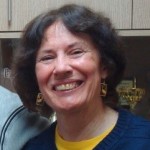My reading
Haftarat Parashat Bo
Jeremiah 46:13-38
46:13 הַדָּבָר֙ אֲשֶׁ֣ר דִּבֶּ֣ר יְהוָ֔ה אֶֽל־יִרְמְיָ֖הוּ הַנָּבִ֑יא לָב֗וֹא נְבֽוּכַדְרֶאצַּר֙ מֶ֣לֶךְ בָּבֶ֔ל לְהַכּ֖וֹת אֶת־אֶ֥רֶץ מִצְרָֽיִם׃
46:14 הַגִּ֤ידוּ בְמִצְרַ֙יִם֙ וְהַשְׁמִ֣יעוּ בְמִגְדּ֔וֹל וְהַשְׁמִ֥יעוּ בְנֹ֖ף וּבְתַחְפַּנְחֵ֑ס אִמְר֗וּ הִתְיַצֵּב֙ וְהָכֵ֣ן לָ֔ךְ כִּֽי־אָכְלָ֥ה חֶ֖רֶב סְבִיבֶֽיךָ׃
46:15 מַדּ֖וּעַ נִסְחַ֣ף אַבִּירֶ֑יךָ לֹ֣א עָמַ֔ד כִּ֥י יְהוָ֖ה הֲדָפֽוֹ׃
46:16 הִרְבָּ֖ה כּוֹשֵׁ֑ל גַּם־נָפַ֞ל אִ֣ישׁ אֶל־רֵעֵ֗הוּ וַיֹּֽאמְרוּ֙ ק֣וּמָה׀ וְנָשֻׁ֣בָה אֶל־עַמֵּ֗נוּ וְאֶל־אֶ֙רֶץ֙ מֽוֹלַדְתֵּ֔נוּ מִפְּנֵ֖י חֶ֥רֶב הַיּוֹנָֽה׃
46:17 קָרְא֖וּ שָׁ֑ם פַּרְעֹ֤ה מֶֽלֶךְ־מִצְרַ֙יִם֙ שָׁא֔וֹן הֶעֱבִ֖יר הַמּוֹעֵֽד׃
46:18 חַי־אָ֙נִי֙ נְאֻם־הַמֶּ֔לֶךְ יְהוָ֥ה צְבָא֖וֹת שְׁמ֑וֹ כִּ֚י כְּתָב֣וֹר בֶּֽהָרִ֔ים וּכְכַרְמֶ֖ל בַּיָּ֥ם יָבֽוֹא׃
46:19 כְּלֵ֤י גוֹלָה֙ עֲשִׂ֣י לָ֔ךְ יוֹשֶׁ֖בֶת בַּת־מִצְרָ֑יִם כִּֽי־נֹף֙ לְשַׁמָּ֣ה תִֽהְיֶ֔ה וְנִצְּתָ֖ה מֵאֵ֥ין יוֹשֵֽׁב׃
46:20 עֶגְלָ֥ה יְפֵֽה־פִיָּ֖ה מִצְרָ֑יִם קֶ֥רֶץ מִצָּפ֖וֹן בָּ֥א בָֽא׃
46:21 גַּם־שְׂכִרֶ֤יהָ בְקִרְבָּהּ֙ כְּעֶגְלֵ֣י מַרְבֵּ֔ק כִּֽי־גַם־הֵ֧מָּה הִפְנ֛וּ נָ֥סוּ יַחְדָּ֖יו לֹ֣א עָמָ֑דוּ כִּ֣י י֥וֹם אֵידָ֛ם בָּ֥א עֲלֵיהֶ֖ם עֵ֥ת פְּקֻדָּתָֽם׃
46:22 קוֹלָ֖הּ כַּנָּחָ֣שׁ יֵלֵ֑ךְ כִּֽי־בְחַ֣יִל יֵלֵ֔כוּ וּבְקַרְדֻּמּוֹת֙ בָּ֣אוּ לָ֔הּ כְּחֹטְבֵ֖י עֵצִֽים׃
46:23 כָּרְת֤וּ יַעְרָהּ֙ נְאֻם־יְהוָ֔ה כִּ֖י לֹ֣א יֵֽחָקֵ֑ר כִּ֤י רַבּוּ֙ מֵֽאַרְבֶּ֔ה וְאֵ֥ין לָהֶ֖ם מִסְפָּֽר׃
46:24 הֹבִ֖ישָׁה בַּת־מִצְרָ֑יִם נִתְּנָ֖ה בְּיַ֥ד עַם־צָפֽוֹן׃
46:25 אָמַר֩ יְהוָ֨ה צְבָא֜וֹת אֱלֹהֵ֣י יִשְׂרָאֵ֗ל הִנְנִ֤י פוֹקֵד֙ אֶל־אָמ֣וֹן מִנֹּ֔א וְעַל־פַּרְעֹה֙ וְעַל־מִצְרַ֔יִם וְעַל־אֱלֹהֶ֖יהָ וְעַל־מְלָכֶ֑יהָ וְעַ֨ל־פַּרְעֹ֔ה וְעַ֥ל הַבֹּטְחִ֖ים בּֽוֹ׃
46:26 וּנְתַתִּ֗ים בְּיַד֙ מְבַקְשֵׁ֣י נַפְשָׁ֔ם וּבְיַ֛ד נְבֽוּכַדְרֶאצַּ֥ר מֶֽלֶךְ־בָּבֶ֖ל וּבְיַד־עֲבָדָ֑יו וְאַחֲרֵי־כֵ֛ן תִּשְׁכֹּ֥ן כִּֽימֵי־קֶ֖דֶם נְאֻם־יְהוָֽה׃
46:27 וְ֠אַתָּה אַל־תִּירָ֞א עַבְדִּ֤י יַֽעֲקֹב֙ וְאַל־תֵּחַ֣ת יִשְׂרָאֵ֔ל כִּ֠י הִנְנִ֤י מוֹשִֽׁעֲךָ֙ מֵֽרָח֔וֹק וְאֶֽת־זַרְעֲךָ֖ מֵאֶ֣רֶץ שִׁבְיָ֑ם וְשָׁ֧ב יַעֲק֛וֹב וְשָׁקַ֥ט וְשַׁאֲנַ֖ן וְאֵ֥ין מַחֲרִֽיד׃
46:28 אַ֠תָּה אַל־תִּירָ֞א עַבְדִּ֤י יַֽעֲקֹב֙ נְאֻם־יְהוָ֔ה כִּ֥י אִתְּךָ֖ אָ֑נִי כִּי֩ אֶעֱשֶׂ֨ה כָלָ֜ה בְּכָֽל־הַגּוֹיִ֣ם׀ אֲשֶׁ֧ר הִדַּחְתִּ֣יךָ שָׁ֗מָּה וְאֹֽתְךָ֙ לֹא־אֶעֱשֶׂ֣ה כָלָ֔ה וְיִסַּרְתִּ֙יךָ֙ לַמִּשְׁפָּ֔ט וְנַקֵּ֖ה לֹ֥א אֲנַקֶּֽךָּ׃










